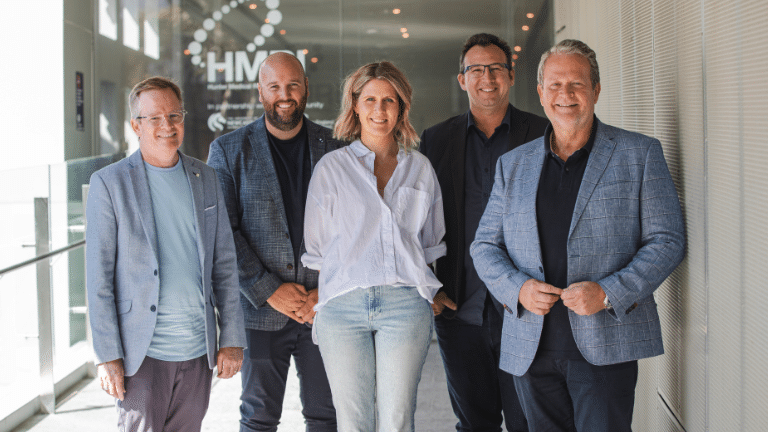
QBE has recently partnered with the Centre for Rehab Innovation (CRI) at HMRI and The University of Newcastle, to take a closer look at the models of care, including community-care based models, that are used to manage injuries acquired in the workplace or because of motor vehicle accidents.

L-R: David Bacon (QBE), Chris Rymer (QBE), Lucy Bailey (CRI), Rohan Walker (CRI) & Michael Nilsson (CRI). Missing from the team photo are Kristy Payne and Michael Pollack from CRI.
Striving to optimise these processes and taking advantage of new innovations when they arise is a major priority for QBE. To this end, QBE has recently partnered with the Centre for Rehab Innovation (CRI) at HMRI and The University of Newcastle, to take a closer look at the models of care, including community-care based models, that are used to manage injuries acquired in the workplace or because of motor vehicle accidents.
A particular concern with workplace and motor vehicle accidents is the risk of patients developing chronic pain.
Chronic pain and its related issues are associated with billions of dollars of additional costs each year that are potentially avoidable.
CRI Clinical Pathways Theme lead and HMRI researcher, Associate Professor Michael Pollack says,
“Chronic pain is recognised to make recovery and successful return to work challenging, as such preventing conversion of acute injury-related pain into chronic pain is of utmost importance.”
“CRI will draw on its extensive expertise in the management of rehabilitation care processes to consider how to best design and implement services that support successful recovery.”
CRI Director and HMRI researcher Professor Michael Nilsson says: “We are particularly interested in early, targeted, proactive interventions in both conventional care as well as community settings. We also need to consider the individual patient holistically from a biopsychosocial perspective”.
CRI co-Director and HMRI researcher Professor Rohan Walker adds: “As important, as patient-centred considerations, there is a need to ensure innovations are developed in a way that they can dock seamlessly into existing care pathways”.
Rehabilitation should be provided in a coherent and adaptive format that optimally supports those recovering from injury.
QBE General Manager People Risk Claims, David Bacon says of the partnership “QBE has a deep commitment to delivering the best possible services for its customers and we seek to work with recognised leaders such as CRI to achieve this objective”.
Chris Rymer, QBE Head of Healthcare, People Risk Claims, Australia-Pacific says: “Working with CRI is very energising, we are excited with what we have co-developed and see that the innovations embedded in the project as transformative”
Professor Michael Nilsson says: “The partnership with QBE combines their industry-leading strengths with CRI’s expertise. Together we form a dynamic partnership with a focus on problem-solving and continuous improvement.
CRI is passionate about delivering impactful changes in healthcare provision and therefore we have an industry-first focus. We understand that our role is to assist our partners to tackle challenges that are important to them.”
CRI and QBE will work together across 2023 to implement a nested series of projects that will consider enhancements to current models of injury management.
CRI collaborates with academic, industry, healthcare, and other partners in Australia and internationally to provide health systems analyses and innovative solutions in health and recovery.
HMRI would like to acknowledge the Traditional Custodians of the land on which we work and live, the Awabakal and Worimi peoples, and pay our respects to Elders past and present. We recognise and respect their cultural heritage and beliefs and their continued connection to their land.
Hunter Medical Research Institute
We’re taking healthy further.
Locked Bag 1000
New Lambton
NSW, Australia, 2305


This site is protected by reCAPTCHA and the Google Privacy Policy and Terms of Service apply.
Copyright © 2024 Hunter Medical Research Institute | ABN: 27 081 436 919
Site by Marlin Communications
